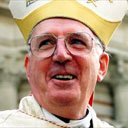
The role of fathers would be "radically undermined" by contentious legislation aimed at making it easier for lesbian couples to become parents through fertility treatment, the most senior Roman Catholic clergyman in England and Wales has warned.
Cardinal Cormac Murphy-O'Connor has expressed strong opposition to the proposed legislation contained in the human fertilisation and embryology bill debated today in the House of Lords, particularly to aspects that recognise same-sex couples as legal parents, and remove the necessity for IVF clinics to consider the need for a father when taking into account the unborn child's welfare.
In a letter to the Times, the cardinal asserted that, by removing the requirement for IVF providers to take into account the child's need for a father when considering an IVF application, the bill conferred legal parenthood on people "who have no biological relationship to a child born as a result of IVF".
He added that the bill "radically undermines the place of the father in a child's life" and said it was "profoundly wrong" that the "natural rights of the child" were being made subordinate to the "desires of the couple".
The cardinal appealed to Gordon Brown to follow the example of the opposition parties and allow Labour members of both houses of parliament a free vote on the bill.
The clause came under fire during its Lords second-reading debate this afternoon, with Lord Mackay of Clashfern, the Tory former lord chancellor who steered the previous 1990 act through the Lords, strongly criticising the plan.
Lady Deech, the crossbencher and former chair of the Human Fertilisation and Embryology Authority, said she was against the clause, but Lady Tonge, the Liberal Democrat peer, made it clear that her party would not seek to delete it from the bill.
As the Lords met, family campaigners stepped up their opposition to the plans.
Iain Duncan Smith, the former Conservative leader, declared that the legislation would drive a "nail in the coffin" of the traditional family, adding that "another blow will have been struck against fatherhood".
In defence of the rights of lesbian couples, Ben Summerskill, the chief executive of the gay rights group Stonewall, said that the bill would merely extend the right already available to heterosexuals.
"At a time when three million children in this country are growing up in single-parent households, it seems odd there should be this obsession with a few hundred who have an opportunity to have a second loving parent," he said.
He hit back at Duncan Smith's views, saying that equating lesbian households with broken homes was "as ludicrous as his attack on all unmarried couples".
He added that it was "bizarre" that the Conservatives wished to "impose" fathers on lesbian households.
The bill also lifts the ban on experiments involving human-animal hybrid embryos, while "chimeras" made of a mosaic-like mix of cells from different species, and "human transgenic embryos" - human embryos modified with animal DNA - will be allowed under licence.
The rules governing IVF clinics producing "saviour siblings" - children created to aid older brothers or sisters with medical conditions - will be relaxed but the bill imposes a ban on sex selection for non-medical reasons.
The bill will double the length of time that IVF clinics can store embryos to 10 years and will also pave the way for embryos to be created from three parents.
Both pro- and anti-abortion peers are expected to use the bill to try to change the law on abortion.

